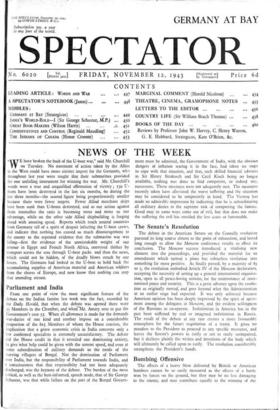Parliament and India
From one point of view the most significant feature of the debate on the Indian famine last week was the fact, recorded by the Daily Herald, that when the debate was opened there were 35 Members in the Chamber, and when—Mr. Amery rose to put the Government's case 53. When all allowance is made for the demands war-duties of one kind and another impose on a considerable proportion of the 615 Members of whom the House consists, the implication that a grave economic crisis in India concerns only a few confirmed specialists is extremely unsatisfactory. The debate did the House credit in that it revealed one dominating anxiety, to give What help could be given with the utmost speed, and even at some subordination of military demands to the needs of the starving villagers of Bengal. Not the domination of Parliament over India, but the responsibility of Parliament towards India, and a consciousness that that responsibiity had not been adequately discharged, was the keynote of the debate. The burden of the most critical, as well as the best-informed, speech made, that of Sir George Schuster, was that while failure on the part of the Bengal Govern-
ment must be admitted, the Government of India, with the obvious dangers of inflation staring it in the face, had taken no stops to cope with that situation, and that, such skilled financial advisers as Sir Henry Strakosch and Sir Cecil Kisch being no longer available, nothing was done to find competent, or indeed any, successors. These strictures were not adequately met. The measures recently taken have alleviated the worst suffering and the situation may be considered to be temporarily in hand. The Viceroy has made an admirable impression by indicating that he is subordinating all ordinary duties to the supreme task of conquering the famine. Good may in some ways come out of evil, but that does not make the suffering the evil has entailed the less acute or lamentable.


























